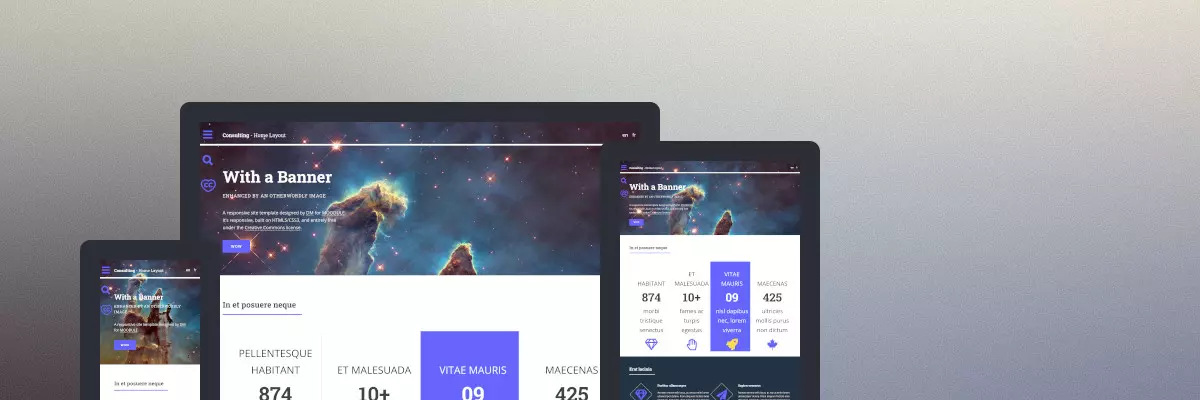A sober, hassle-free, jekyll template for businesses.
You can preview the theme here

Responsive: out of the box support for all screen sizes, be it smartphones, laptops, tablets...
Multilingual: easily manage pages, menu, url, dates, sitemap in several languages
Customizable: theme colors, menu, social items can be changed from a central config file
Many Widgets: tabs, mini-posts, spotlight, feature listings, and more can be easily inserted without worrying about their internals
Many templates: contact forms, navigation menus, and others can be easily inserted thanks to custom Jekyll includes
Vector images: the theme images are vectorized, render smoothly on any display and can be dynamically styled
GDPR ready: bundled with a cookie consent plugin and a boilerplate privacy policy compliant with GDPR
SEO ready: sitemap, robots.txt and tags are automatically generated for the website
Light: svg images, thumbs and lazy loading for raster images, few libraries
Performant: parallel loading & execution of assets, support lazy-loading, minified assets, compressed critical path
Hardened: form validation, recaptcha, verified libraries
Add this line to your Jekyll site's Gemfile:
gem "jekyll-theme-consulting"And add this line to your Jekyll site's _config.yml:
theme: jekyll-theme-consultingAnd then execute:
$ bundle
Or install it yourself as:
$ gem install jekyll-theme-consulting
For those unfamiliar with how Jekyll works, check out jekyllrb.com for all the details, or read up on just the basics of front matter, writing posts, and creating pages.
Copy the file _config.yml from the theme repository to the root of your website folder tree.
The following section explains what the settings impact and how to configure _config.yml properly.
You can use the following custom parameters in _config.yml.
Both title and subtitle are displayed side by side :
Social icons will appear for each url your fill in, among facebook_url etc.
Your contact information can be used in contact forms, the footer or anywhere else.
The contact form is validated using google's recaptcha plugin.
First, you need to [sign your website up] to enable the plugin.
Google will provide you with a client-side integration key: copy it to _config.yml under recaptcha.sitekey.
Images downloading & rendering can be defered until they enter the viewport. This shortens the loading of the webpage, with no consequence on the displayed content since the images are off-screen.
There are 2 possibilities:
Browser support for lazy-loading is varying, so it is recommanded to opt for the first solution.
class="lazy-loading"src with the path to the placeholder filedata-src with the path to the content fileBefore:
<img src="{{ 'assets/images/content.jpg' | absolute_url }}" />After:
<img class="lazy-loading" src="{{ 'assets/images/placeholder.jpg' | absolute_url }}" data-src="{{ 'assets/images/content.jpg' | absolute_url }}" />loading="lazy"Before:
<img src="{{ 'assets/images/content.jpg' | absolute_url }}" />After:
<img loading="lazy" src="{{ 'assets/images/content.jpg' | absolute_url }}" />This functionality is not supported by all the browsers!
It is recommanded to use the webp format.
At a given dimension and compression level (quality) the webp files are at least half the size with a smoother feel.
In your own website's repository, edit the _config.yml file:
url: "https://<github-account-name>.github.io/<repository-name>"Build the website with:
$ JEKYLL_ENV=production bundle exec jekyll build
Commit all your work to the current branch.
Create a branch named gh-pages:
$ git checkout -b gh-pages
And finally replace the repository's content with the generated webpages:
$ mkdir ~/backup
$ mv ./* ~/backup/
$ mv ~/backup/.git ./
$ mv ~/backup/_site/* ./
$ git add .
$ git commit -m "First draft"
The repository's content is backup in the home directory of the user.
And finally push to github
$ git push --u origin gh-pages
In your own website's directory, edit the _config.yml file:
url: "https:<domain-name>"Build the website with:
$ JEKYLL_ENV=production bundle exec jekyll build
Copy the content of the folder _site to your server, most likely in www.
If necessary, configure your server to serve this directory.
Bug reports and pull requests are welcome on GitHub at https://github.com/apehex/jekyll-theme-consulting. This project is intended to be a safe, welcoming space for collaboration, and contributors are expected to adhere to the Contributor Covenant code of conduct.
To set up your environment to develop this theme, run bundle install.
To test the theme, run bundle exec jekyll serve and open your browser at http://localhost:4000. This starts a Jekyll server using the theme. Add pages, documents, data, etc. like normal to test the theme's contents. As you make modifications to the theme and to your content, your site will regenerate and you should see the changes in the browser after a refresh, just like normal.
When the theme is released, only the files in _layouts, _includes, _sass and assets tracked with Git will be bundled.
To add a custom directory to the theme-gem, please edit the regexp in jekyll-theme-consulting.gemspec accordingly.
Inspired by the work of @ajlkn.
Uses the basic template from the cookie consent plugin.
Uses the simple Jekyll search plugin.
Space image in the banner: the Pillars of Creation, courtesy of NASA.
The theme is available as open source under the terms of the CC-BY-NC-SA-4.0.